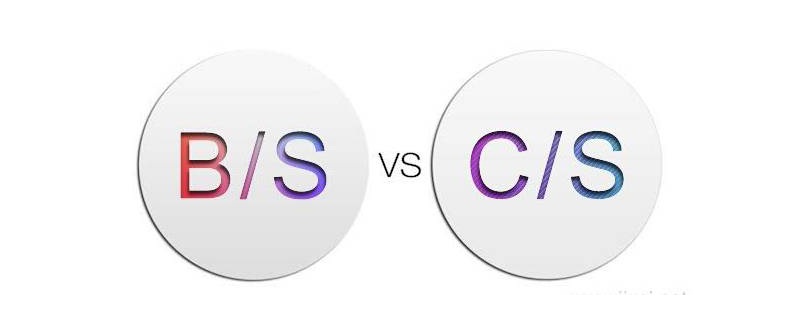This article mainly introduces the difference between C/S architecture and B/S architecture. C/S architecture is a typical two-layer architecture. The whole process is client/server, etc., client server architecture, client Contains one or more programs running on the user's computer; the B/S architecture is called browser/server and browser/server structure.

C/S architecture
C/S architecture is a typical two-layer architecture, and the whole process is client/server , client server architecture, the client contains one or more programs running on the user's computer, there are two servers, one is a database server, the client accesses server-side data through the database connection; the other is a socket server, The server communicates with the client through a socket program.
C/S architecture can also be regarded as thick client architecture. Because the client most needs to implement business logic and interfaces for display. In this architecture, since the client needs to withstand a lot of pressure because both display logic and transaction processing are included, persistent data is achieved through interaction with the database (usually SQL or stored procedures) to meet the actual project needs.
Advantages and disadvantages of C/S architecture
Advantages:
1. The interfaces and operations of C/S architecture can be very rich.
2. Security attributes can be easily guaranteed, and it is not difficult to implement multi-layer authentication.
Because there is only one layer of interaction, the response speed is fast.
Disadvantages:
1 The scope of application is narrow, usually suitable for local area networks.
2 Fixed user group. Because this program requires installation before it can be used, it is not suitable for some unknown users.
3. Maintenance costs are high. Once upgraded, all client applications need to be changed.
B/S architecture
The B/S architecture is called browser/server and browser/server structure. The browser refers to the Web browser. A small amount of business logic is on the front end, but the main business logic is called in the three-tier architecture of server, browser client, WebApp server and DB terminal. The B/S system does not require special installation, only a web browser can.
B/In the S architecture, the display logic is placed in the transaction processing logic of the Web browser and placed on the WebApp, thereby avoiding a huge fat client and reducing the pressure on the client. Because the client contains very little logic, it is also called a thin client.
Advantages and disadvantages of B/S architecture
Advantages:
1) No need to install a client, just a web browser.
2) The BS architecture can be placed directly on the Internet to achieve the purpose of controlling multi-client access through certain permissions and is highly interactive.
3) The BS architecture does not require updating multiple clients, just upgrade the server.
Disadvantages:
1) In cross-browser, BS architecture is not as good as people hope.
2) Getting a CS degree requires a lot of hard work.
3) Huge design costs are required for speed and security, which is the biggest problem in the BS architecture.
4) Client-server interaction is a request-response mode, which usually requires refreshing the page, which is not what customers want to see. (In Ajax, when the problem is alleviated to a certain extent, it will become popular)
The above is the detailed content of Detailed explanation of the difference between C/S architecture and B/S architecture. For more information, please follow other related articles on the PHP Chinese website!